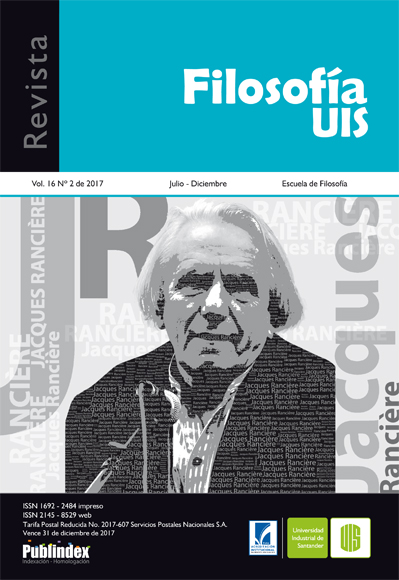Scientific explanation and the Troubles with Causal Explanations in physics
Publicado 2017-12-14
Palavras-chave
- scientific explanation,
- theoretical explanation,
- incompatibility,
- causal explanation,
- Newtonian mechanics
- relativity theory ...Mais
Como Citar
Copyright (c) 2017 Revista Filosofía UIS

Este trabalho está licenciado sob uma licença Creative Commons Attribution 4.0 International License.
Resumo
Fifty years ago, Carl Gustav Hempel published his famous book Aspects of Scientific Explanation. Since then the number of publications on this subject has grown exponentially. An occasion like this deserves to be commemorated. In this article I offer a modest tribute to this great methodologist of science.
This paper tackles the uses of explanation in theoretical sciences. In particular it is concerned with the possibility of causal explanations in physics. What I intend to do is to focus on the issue of whether the explanation of Kepler’s empirical laws of the planetary motions can be a causal explanation. More specifically my point is: can the deductive subsumption of Kepler’s 3rd Law (also known as Kepler’s 1-2-3 law) under theoretical principles provide a causal explanation for the planetary motions?
My answer is a definitive no. As a matter of fact, on occasion subsumptions occur under differing theoretical principles that are incompatible with one another. In such cases we would have incompatible scientific explanations. This is precisely the situation facing the scientific explanation of Kepler’s laws, in particular the third law. Since there exist incompatible gravitational theories, it is impossible for the scientific account of Kepler’s law to be a causal explanation of the planetary motions. This is just one example of the difficulties faced by causal explanations in sciences such as theoretical physics.
Downloads
Referências
Einstein, A. (1914). Principles of Theoretical Physics. Inaugural address before the Prussian Academy of Sciences. Reprinted in A. Einstein. (1973). Ideas and
Opinions, (221-223). London: Souvenir Press Ltd.
Einstein, A. (1927). The Mechanics of Newton and their Influence on the Development of Theoretical Physics. Die Naturwissenschaften, 15 (1927).
Reprinted in A. Einstein. (1973). Ideas and Opinions, (221-223). London: Souvenir Press Ltd.
Hempel, C. G. (1965). Aspects of Scientific Explanation and Other Essays in the Philosophy of Science. New York: Free Press.
Hempel, C. G. (1966). Philosophy of Natural Science. Englewood Cliffs, N. J: Prentice-Hall, Inc.
Misner, Ch.; Thorne, K. & Wheeler, J. A. (1973). Gravitation. New York: Freeman and Company.
Popper, K. (1959). The Logic of Scientific Discovery. London: Hutchinson.
Popper, K. (1963). Conjectures and Refutations. The Growth of Scientific Knowledge. London: Routledge and Kegan Paul.
Popper, K. (1972). Objective Knowledge. Oxford: Clarendon Press.
Popper, K. (1979). Die beiden Grundprobleme der Erkenntnistheorie. Tübingen: J. C. B. Mohr (Paul Siebeck).
Popper, K. (1983). Realism and the Aim of Science. London: Hutchinson.
Rivadulla, A. (1991). Probabilidad e Inferencia Científica. Barcelona: Anthropos.
Rivadulla, A. (2004). Éxito, Razón y Cambio en Física. Madrid: Trotta.
Rivadulla, A. (2015). Meta, Método y Mito en Ciencia. Madrid: Trotta.
Straumann, N. (2004). General Relativity. With Applications to Astrophysics. Berlin: Springer.
